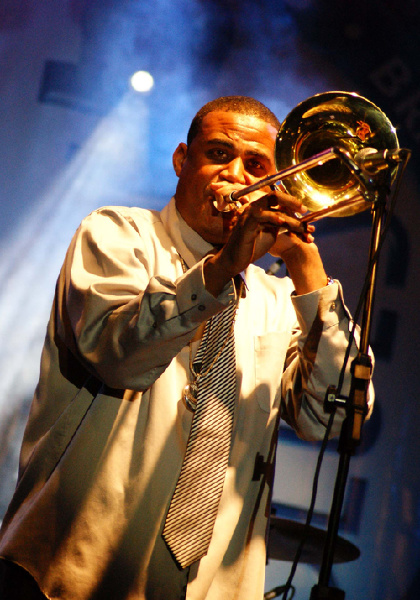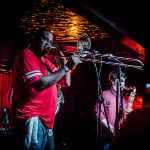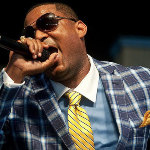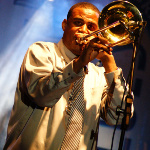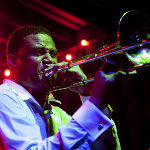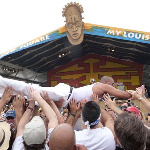- country:USA
- region:North America
- style(s):Jazz, Soul
- label:Toptone
- type:Band
- gender:male
- instrumentation:instrumental, vocal, singer songwriter
- artist posted by:Top Tone Music
In a city whose spirit world is as old as Mother Africa’s children, Glen David Andrews, a native son of New Orleans, has made a compelling case for his own deliverance with a powerful new project that correlates his own reclaimed life to his reclaimed city.
Recorded at the Living Room, a converted church on the West Bank, in Algiers, just outside of New Orleans in November 2013, Redemption is Andrews's balm after a very personal storm. The music is about ghosts and their residual energy; about acceptance and forgiveness; about rebirth and renewal. “Every song on this record tells a story that I hope people will relate to,” the singer, songwriter and trombonist says proudly. “This is a record about my journey back from the living dead.”
Redemption features Andrews's core band and a few chosen friends who've played a part in his spiritual recovery. Ivan Neville lays down gritty grooves on a humming Hammond organ and a badass clavinet, the history of modern funk percolating in his fingertips on “Bad By Myself” and “Movin' Up.” Jamison Ross, winner of the prestigious 2012 Thelonious Monk Institute of Jazz competition, brings his own brand of bonhomie to the music, singing, arranging, playing drums, percussion and organ on “Chariot” and “Surrender.” Guitar god Anders Osborne played a pair of solos from a studio hundreds of miles upriver literally hours after finishing a tour with the Grateful Dead's Phil Lesh, on “Lower Power” and “You Don't Know.”
The album also features a suprise – the radiant voice of the Queen Mother of Gospel, Mahalia Jackson -- on a rousing version of her joyous hymn, “Didn't It Rain.”
A warrior for cultural preservation in New Orleans at a time when indigenous traditions are being threatened, Andrews is standing up now for his own salvation. As the journalist Larry Blumenfeld, a Katrina Media Fellow with the Open Society Institute, has written: ”Long before he began trying to save himself in earnest, Andews's music projected the promise of redemption...His remarkable singing voice and commanding trombone sound (both powerful, direct, resonant, and with just enough rasp) as well as his disarmingly honest manner have provided whatever the situation calls for: beauty, truth, compassion, anger, joy or all of the above.”
Andrews comes from a storied extended family of musicians. He was born in the historic Tremé neighborhood – which many consider to be the oldest black community in the United States – where the struggle to survive is older than the mighty oak trees in the Crescent City. According to family folklore, Anthony “Tuba Fats” Lacen, a patriarch of modern New Orleans music, directed the bell of his horn toward Andrews's mother's belly as a way to induce labor. Andrews was born the following day. Transfixed by the magic and mystery of the city's second-line parades, Andrews and his older brother, Derrick Tabb of the Rebirth Brass Band, along with their younger cousin Troy “Trombone Shorty,” soaked up life's musical lessons by learning the history of the brass band tradition firsthand from iconic figures like Tuba Fats. They also learned the power of the city's Mardi Gras Indian culture.
“The musicians I heard coming up literally brought me out of the womb,” Andrews says. “Jesus was born in a manger. I was born in a second line.”
Starting on the bass drum as a child, Andrews soon picked up the trombone; he was blowing a joyful noise by the time he was 12. He practiced his musicianship and showmanship with the city's most energetic brass bands, from New Birth and L’il Rascals to ReBirth and Treme. "He's always had a massive presence and a massive sweetness,” says Paul Sanchez, the New Orleans singer-songwriter who has collaborated with Andrews.
That presence and sweetness have long endeared Andrews to audiences at his regular gigs at such New Orleans clubs as dba and Three Muses. In recent years he began making waves as a headliner at the world's biggest block party – the annual New Orleans Jazz & Heritage Festival where he has ripped it up in the gospel tent, the blues tent and the jazz tent. “ “Glen is one of the giant talents of New Orleans music,” says the festival's producer Quint Davis.
Andrews says he's determined to make new fans with Redemption. Leo Sacks, who produced the project, says that ”Glen surprised everyone with the emotional range and maturity of his voice. It was astonishing to hear him slide from a whisper to a scream.” A dear friend of New Orleans music who produced the New Orleans Social Club's Sing Me Back Home after Katrina and won a 2014 Grammy Award for documenting the life's work of Bill Withers, Sacks says that Andrews conjured “the soul fire of Wilson Pickett, the preacher power of Solomon Burke and the world-weariness of Louis Armstrong's voice. He took artistic risks that were tremendously courageous.”
The centerpiece of the new album is “Surrender,” a deeply personal song about acceptance which Andrews wrote in rehab. “I woke up from a nightmare, in a cold sweat,” he recalls in chilling detail. “That nightmare was my life. I realized I had been given an opportunity to change my attitudes, my actions, my whole outlook on living. I knew it was okay to forgive myself. That was my moment of grace.”
With the release of Redemption, Louisiana Red Hot Records is also making available four of Andrews's previous projects: the gospel-driven Walking Through Heaven’s Gate (recorded live in 2009 at Zion Hill Baptist Church in New Orleans where Andrews was baptized); Live at Three Muses, a sweaty club date from 2012; and two trad jazz releases, French Quarter Jazz from Jackson Square (his first recording, from 1997) and Dumaine Street Blues (2002).
Writing in the Wall Street Journal last year, journalist Blumenfeld offered: “Onstage and off, electrifying club audiences and street scenes, speaking his mind at civic rallies, Glen David Andrews perhaps best embodies what David Simon, creator of the HBO series Treme, meant when he said, "culture is what brought New Orleans back."
“Life is hard and you have to be bold, you have to make choices,” Andrews says. “Katrina was disorienting but we've got to move on. My Tremé will never be the same. But New Orleans culture is a permanent part of me. My Tremé taught me about the happiness of entertaining and respecting the power of the moment. The gift of my sobriety is in my music now and I want to share my my Tremé – my New Orleans – with the world.”
From Job in the Bible and Apollo in Greek mythology to Bob Marley and Sam Cooke in popular music, redemption is a classical theme that comes in every shade of blue. Redemption is Glen's love letter to the Maker for a second chance at life. “I'm learning that you can't change anyone else,” Andrews says. “but you can always change yourself.”


